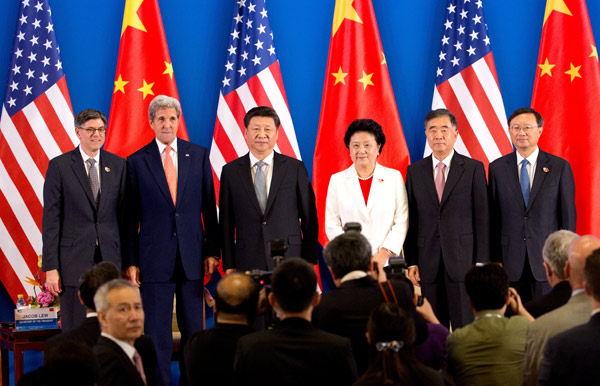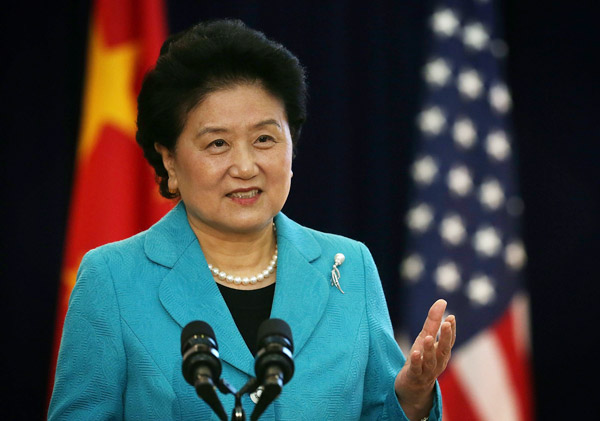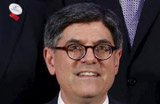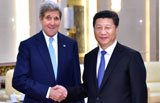President Xi calls for calm at US talks
Updated: 2016-06-06 11:54
By AN BAIJIE in Beijing and CHEN WEIHUA in Washington (chinadaily.com.cn)
Comments Print Mail Large Medium Small
 |
|
Chinese President Xi Jinping (3rd L), Chinese Vice-Premier Liu Yandong (3rd R), Chinese Vice-Premier Wang Yang (2nd R), Chinese State Councilor Yang Jiechi (1st R), US Secretary of State John Kerry (2nd L) and US Treasury Secretary Jacob Lew (1st L) pose for photos at the opening ceremony on June 6 in Beijing. [Photo by Feng Yongbin/chinadaily.com.cn] |
President Xi Jinping called for a joint effort with the United States to manage disagreements and handle sensitive issues, during an annual high-level discussion opened on Monday.
"It's inevitable that the two countries have disagreements... Even in a family, there are various disputes," Xi said. "The key is that we should not use disputes as an excuse for confrontational attitude."
Xi was speaking at the open ceremony of the eighth round of US-China Strategic and Economic Dialogues, in the Diaoyutai State guesthouse in Beijing.
More than 400 United States delegates, including about 10 ministers, are attending the two-day dialogue. Launched in 2009, it has become an important communication platform between the two countries.
"Just as Confucius said 2,000 years ago, I do not know how a man without truthfulness is acceptable," Xi said, adding that the two countries should boost mutual trust.
Both sides should enhance communications on Asian and Pacific issues, while the broad Pacific should not become an arena for various parties, but a platform for communications, he said.
While noting he had visited the US many times, Xi said the US citizens held friendly feelings towards Chinese people. China-US people-to-people exchanges reached 5 million last year.
"What is the most important is that both sides should stick to the principles of no conflicts, no confrontation, mutual respects and cooperation for win-win results," he said.
Xi called for the strengthening of macroeconomic coordination between the world's two largest economies. He said both countries should also cooperate to ensure the G20 Summit, which will be held in Hangzhou, Zhejiang province in September, achieves the desired results.
Xi added that the two sides should conclude the bilateral investment treaty negotiations, which would benefit both economies, as soon as possible.
US Secretary of State John Kerry will co-chair the event's strategic discussions with State Councilor Yang Jiechi, on Monday. Vice-Premier Wang Yang and US Treasury Secretary Jacob Lew will lead economic talks.
In his speech, Kerry said he toured a Forbidden City garden on Sunday, which was jointly restored by Chinese and US experts.
In the coming days, the relationship between the two countries would move forward, he said.
Zhiqun Zhu, associate professor of political science and international relations, and John D. MacArthur Chair of East Asia Politics at Bucknell University (Philadelphia), told China Daily that on the security side, several topics will dominate the dialogue. Those include the South China Sea dispute, Korean Peninsula, military to military relations, global health issues and energy security, among others.
"On the economic side, likewise, there are several prominent issues: a bilateral investment agreement in the context of growing Chinese investment in the US, new Chinese law regarding NGOs, slower Chinese growth and its impact on US and global recovery, etc," he said.
Wang Fan, vice-president of the China Foreign Affairs University, said strategic competition between China and the US was increasing, even though the two countries had made progress on military and people-to-people exchanges.
There is an urgent need to maintain China-US strategic stability and to reduce misunderstandings, he said.
John Frisbie, president of the US-China Business Council, an organization of American companies investing and trading in China, said regardless of the outcomes of this round of dialogues, the next US administration should continue the S&ED or something like it, along with annual presidential summits and other well-coordinated government-to-government engagements.
"Though the structure and content could be tinkered with, smart engagement is critical; not talking frequently and at a high-level with China would be a mistake," he said.
Xin Zhiming contributed to this story.







